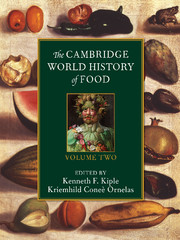Book contents
- Frontmatter
- Part V Food and Drink around the World
- Part VI History, Nutrition, and Health
- VI.1 Nutrition and the Decline of Mortality
- VI.2 Nutrition and Mortality Decline: Another View
- VI.3 Infection and Nutrition: Synergistic Interactions
- VI.4 Famine
- VI.5 Height and Nutrition
- VI.6 The Nutrition of Women in the Developing World
- VI.7 Infant and Child Nutrition
- VI.8 Adolescent Nutrition and Fertility
- VI.9 Nutrition and Mental Development
- VI.10 Human Nutritional Adaptation: Biological and Cultural Aspects
- VI.11 The Psychology of Food and Food Choice
- VI.12 Food Fads
- VI.13 Food Prejudices and Taboos
- VI.14 The Social and Cultural Uses of Food
- VI.15 Food as Aphrodisiacs and Anaphrodisiacs?
- VI.16 Food as Medicine
- VI.17 Vegetarianism
- VI.18 Vegetarianism: Another View
- Part VII Contemporary Food-Related Policy Issues
- Part VIII A Dictionary of the World’s Plant Foods
- Name Index
- Subject Index
- References
VI.17 - Vegetarianism
from Part VI - History, Nutrition, and Health
Published online by Cambridge University Press: 28 March 2008
- Frontmatter
- Part V Food and Drink around the World
- Part VI History, Nutrition, and Health
- VI.1 Nutrition and the Decline of Mortality
- VI.2 Nutrition and Mortality Decline: Another View
- VI.3 Infection and Nutrition: Synergistic Interactions
- VI.4 Famine
- VI.5 Height and Nutrition
- VI.6 The Nutrition of Women in the Developing World
- VI.7 Infant and Child Nutrition
- VI.8 Adolescent Nutrition and Fertility
- VI.9 Nutrition and Mental Development
- VI.10 Human Nutritional Adaptation: Biological and Cultural Aspects
- VI.11 The Psychology of Food and Food Choice
- VI.12 Food Fads
- VI.13 Food Prejudices and Taboos
- VI.14 The Social and Cultural Uses of Food
- VI.15 Food as Aphrodisiacs and Anaphrodisiacs?
- VI.16 Food as Medicine
- VI.17 Vegetarianism
- VI.18 Vegetarianism: Another View
- Part VII Contemporary Food-Related Policy Issues
- Part VIII A Dictionary of the World’s Plant Foods
- Name Index
- Subject Index
- References
Summary
Human populations often have been obliged to subsist on an all-vegetable diet because of a poverty or scarcity of animal foods. The term “vegetarianism,” nevertheless, is usually reserved for the practice of voluntary abstention from flesh on the basis of religious, spiritual, ethical, hygienic, or environmental considerations. These in turn have led to still finer distinctions regarding exactly what nonmeat articles of diet are permissible, resulting in the fragmentation of vegetarians into several groups. The great majority of adherents are “lacto-ovo” vegetarians, who reject flesh but find dairy products and eggs acceptable. Smaller groups include “vegans,” who admit no animal products whatsoever into their diet; “lacto-vegetarians,” who consume milk but not eggs; “ovo-vegetarians,” who allow eggs but not milk; “fruitarians,” who eat only fruits and nuts; “raw foodists”; and “natural hygienists,” who scorn even vegetable foods if these have been processed or refined. And because – for all those classes – vegetarianism implies a concern to persuade others to adopt meatless diets, the history of vegetarianism is, at core, the history of the development of arguments used to justify and to proselytize for a vegetable diet.
Vegetarianism in Eastern Religion
The most notable examples of a religious basis for vegetarianism are to be found in Asian culture. Hinduism, though not requiring a strictly vegetable diet, has fostered a significant tradition of vegetarianism among certain believers for more than two millennia. The practice is still more widespread in Buddhism, where the doctrine of ahimsa, or nonviolent treatment of all beings, forbids adherents to kill animals for food. Many Buddhists do, nevertheless, eat meat, supporting the indulgence with the argument that the animal was killed by others. Jainism, likewise, espouses ahimsa and specifically denies meat to any practitioners of the faith (Barkas 1975; Akers 1983: 157–64).
- Type
- Chapter
- Information
- The Cambridge World History of Food , pp. 1553 - 1564Publisher: Cambridge University PressPrint publication year: 2000



